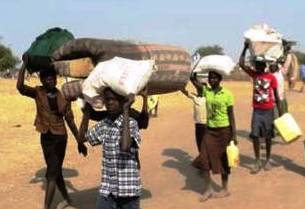The Episcopal Church of South Sudan & Sudan (ECSS&S) is working hard to provide practical support to thousands across the country who have fled conflict and been left without food, water or shelter.
More than 400,000 people have been displaced and up to 10,000 have been killed in violence that has swept through the country since December.
Anglican agencies are working collectively with the Anglican Alliance to support the ECSS&S in its response to the crisis, assisting those suffering in South Sudan at the local level. Agencies and companion links have maintained close connections with their partners in South Sudan, many already sending emergency support, e.g. for feeding children in Awerial and support for people sheltering in Juba Cathedral compound.
Long term, the Church also has a unique and distinctive role in helping to restore communities, promote reconciliation and heal trauma.
Local churches are currently sheltering and supporting people in need, particularly in areas where the international agencies cannot reach. Thousands are crowding into church compounds around the country, both in areas at the heart of the violence, but also in unaffected areas where church communities are hosting internally displaced people (IDPs) without sufficient resources.
You can support the appeals of these Anglican agencies by following these links:
Episcopal Relief & Development
Primates World Relief and Development Fund
A combined proposal has been developed by ECSS&S’s Emergency Crisis Committee and SUDRA, the Church’s local Relief and Rehabilitation Agency. The Anglican Alliance and Anglican partners have discussed a phased response with them through conference calls to ensure effective cooperation. The plans will be posted shortly on the Anglican Alliance’s website.
The regular Alliance conference calls involving the Anglican Board of Mission and Anglican Overseas Aid in Australia, CMS UK, the Mothers’ Union and the Salisbury-Sudan Link in the UK, Episcopal Relief & Development in the US and the Primate’s World Relief and Development Fund in Canada have ensured close contact and coordination with SUDRA is maintained.
Top priorities for the relief response have been identified as SUDRA develops its proposal with the Emergency Crisis Committee, which has been set up by Archbishop Daniel Deng Bul Yak.
Anglican Alliance Co-Director, Rachel Carnegie and Canon Grace Kaiso, CAPA General Secretary and Alliance Board member, will be visiting Juba this week to meet with Archbishop Daniel and his team and learn more about the situation.
Awerial is among the top priorities for the immediate response. Just outside of Bor, the district received an influx of 76,000 people when fighting started in December. There is little food, water and shelter, and families are struggling to survive. Nine relief centres have already been set up by ECSS&S, to provide supplies and pastoral care to those taking refuge in the area.
The Church is also looking after those who are especially vulnerable and have sought refuge in church compounds in Juba and elsewhere. Other acutely affected communities, identified by SUDRA, are in the dioceses of Renk, Malakal, Bor and Bentiu.
A further priority is Nimule, on the border with Uganda. Over 3000 people are currently crossing the border into Uganda every day and 80 per cent of these are children (UN figures, 10 January 2014).
In a recent letter to the Archbishop of Canterbury, Most Revd Daniel Deng Bul, asked for the help of Anglicans around the world as the Church works to provide shelter and support to those who needed it most.
In line with their relief efforts, churches and agencies are also co-ordinating advocacy for peace and reconciliation in the region. Since the crisis in South Sudan erupted, The Episcopal Church has convened four conference calls which brought together the Anglican Alliance with partners, relief agencies, NGOs and Bishops of ECSS&S.
These coordinated calls have allowed individuals to share critical information and advocacy priorities, including the need to allow safe access for humanitarian aid.
Shared information has assisted The Episcopal Church Office of Government Relations in putting together a detailed memo which was sent to the Obama administration, as well as to members of Congress, urging the U.S government to collaborate with civic and faith institutions of South Sudan to stem the tide of violence and build peace.
We continue to pray for the work of the local Church in South Sudan, who are working tirelessly to support their communities and call for peace in their country.
In the picture: Some of the 76,000 people arriving in Awerial after fighting broke out in Bor.

